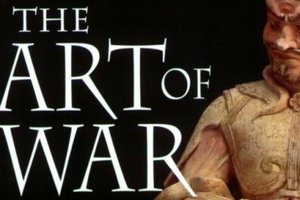A small fragment from the summary "The art of war"

We introduce you a small fragment from the summary "The art of war".
The Art of War
Sun Tzu
Two and a half millennia is a long term for any book. The fact, that the book which represents in a sense the textbook, during all this time is constantly used by the most different people is quite unique ("The art of war" can quite compete with sacred books in popularity).
To achieve such success, the book in itself has to be the precious treasure. Behind each of its paragraph, there is an experience of the ingenious commander and philosopher, equally observant and skillful in conclusions.
The teacher Sun had outstripped the time, and not only in a military field of activity. "The art of war" is the first book which laid the theoretical foundation of espionage (for a long period of time it remained the only similar work). Besides, there for the first time – in the analysis of the most effective antagonism with the enemy – constructive use of chaos is described (we will notice that scientists-mathematicians – Poincare, Kolmogorov, Arnold, Mozes – approached the theory of chaos only in the twentieth century!).
War is extremely important for the state; it defines its life and death.
To understand prospects, it is necessary to deal with five components of war and answer seven questions.
• "Way" – people’s attitude to their governor, whether they trust him unconditionally, whether they are ready to follow him to death. These are human resources plus charisma of the governor;
• "Sky" – this is the temporary resources which the belligerent party has;
• "Earth" – the advantages and shortcomings which are given by the district;
• "Commander" – personal qualities of the commander: mind, impartiality, courage;
• "Law" – everything that touches the troops: their readiness to battles, the officer’s level, quality of supply.
The seven questions that you should ask before entering a war:
• Which of the two rulers of the states at war commands complete accord and obedience from his people so that they will follow him even to their deaths?
• Which of the two generals is more capable?
• Which side have advantages of heaven and earth, meaning circumstances like the weather, distances to be covered and the nature of the terrain?
• Which side enforces the discipline of its men more strongly?
• Which side has a stronger army?
• Which side has the better-trained officers and men?
• Which side has more consistency in giving rewards and punishments to enforce discipline?
You can read the whole summary "The art of war" in Georgian here.

